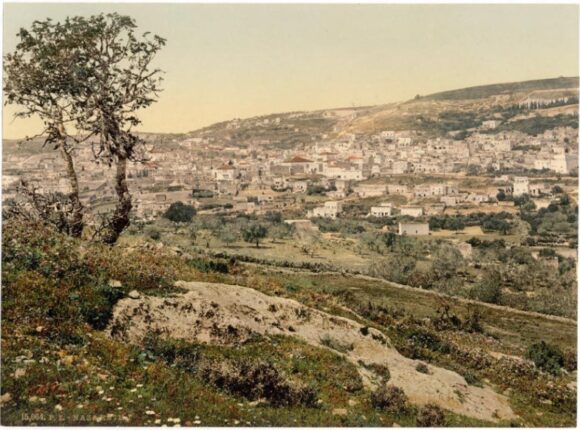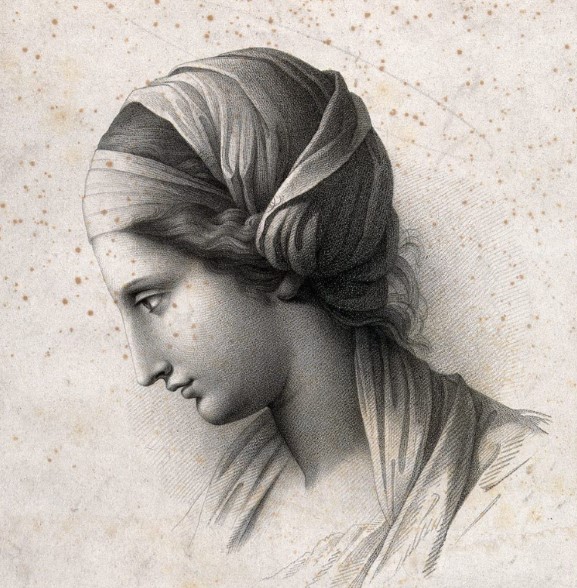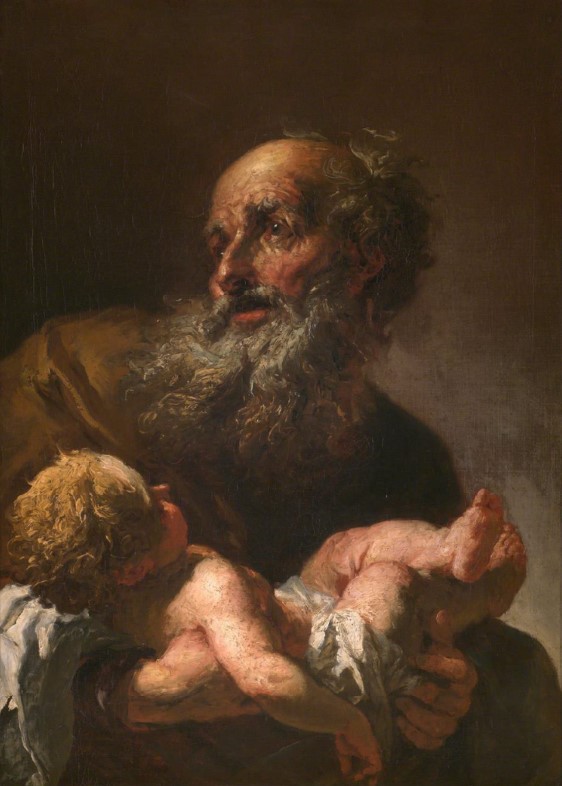IN THE FIRST Century ad the Roman empire was peaceful and prosperous under the iron fist of the Legions. But that prosperity was paid for by heavy taxes on its subject nations. Life was difficult in Galilee, a small province to the north of Judea on the Mediterranean coast. Archaeology shows evidence of severe poverty and malnutrition among the population at the time.
There was an unremarkable village called Nazareth in the southern hills. Its residents would have scratched out a living by farming. There was a carpenter, whose name was Joseph. (The Bible calls him a carpenter (Matthew 13:55), he was probably the village jobbing builder.) He was pledged to be married to Mary, a local girl.
From what we know of the custom of the time, it’s likely that Mary was a teenager. We know very little about her, but we do know her ancestry. The Jews were meticulous about recording family trees. Matthew’s Gospel gives Joseph’s ancestry (Matthew 1:1–16)—he was descended directly through the royal line from David, the great King of Israel who ruled at the nation’s zenith one thousand years previously. Luke’s Gospel details Mary’s ancestry (Luke 3:23–38)—she was also descended from David, through a younger son. The kings of Israel were long since finished, but it’s interesting to observe that if there had still been a throne in Jerusalem, a son of Joseph and Mary would have had an impeccable claim to it.
The other thing we know about Mary is that she was a beautiful person. I don’t mean her appearance, that’s not important (Proverbs 31:30)—I mean that as we see the account of her unfold in the Gospels, we see a character of enormous faith, strength and humility.
Visit of An Angel
In the sixth month the angel Gabriel was sent from God to a city of Galilee named Nazareth, to a virgin betrothed to a man whose name was Joseph, of the house of David. And the virgin’s name was Mary. And he came to her and said, “Greetings, O favoured one, the Lord is with you!” But she was greatly troubled at the saying, and tried to discern what sort of greeting this might be. And the angel said to her, “Do not be afraid, Mary, for you have found favour with God. And behold, you will conceive in your womb and bear a son, and you shall call his name Jesus. He will be great and will be called the Son of the Most High. And the Lord God will give to him the throne of his father David, and he will reign over the house of Jacob for ever, and of his kingdom there will be no end” (Luke 1:26–33).
It was every Jewish woman’s prayer to be the mother of the Messiah. According to the prophet the time was now right for the Messiah to appear (Daniel 9:24–27). The First Century historian Josephus records that Jews at the time were in high expectation, and so does the Bible (Luke 2:38). What would go through Mary’s mind as the angel delivered his message?
Fear, probably, and maybe panic. In the highly religious environment of a First Century Jewish village, to be unmarried and pregnant would have been catastrophically shameful. She could have been stoned to death (Deuteronomy 22:20–21). But she immediately accepted God’s will.
And Mary said, “Behold, I am the servant of the Lord; let it be to me according to your word” (Luke 1:38).
We have seen that Mary’s genealogical credentials were right to be the mother of the Messiah, but that was not all that mattered. God would be very careful about the person to whom He would entrust His son. Here, from her first recorded words, we see a glimpse of why He chose Mary.
Shame and Encouragement
Life became very complicated. The opportunity came for Mary to leave Nazareth—it’s wonderful the way God works. Mary’s aged cousin Elizabeth was also pregnant through a miracle (Luke 1:5–25), and Mary went to see her. She would be able to tell Elizabeth and her husband everything, they would understand and believe her without question, and she spent three joyous months with them (Luke 1:39–56). Then bolstered in her faith and courage, she returned to Nazareth. By this time her pregnancy would be starting to show. Joseph was of course devastated. But an angel reassured him, and to his great credit he believed and married Mary—knowing the shame that this would bring on him (Matthew 1:18–25).
We’re not told what Mary went through. Throughout his life, Jesus lived with the stigma of dark gossip about his legitimacy (for example John 8:41). Mary must have been the target of immense hostility, but God gave her the encouragement of a devoted and unquestioning husband. This is the way God works—in His wisdom He may give grievous trials to His children, but He will never leave them without comfort (Hebrews 13:5–6).
Jesus’ Childhood
The story of Christ’s birth is well known. He was born in a stable in Bethlehem, and laid in a manger. Shepherds came to see him (Luke 2:15–20), and some time later an exotic party of dignitaries arrived after an epic journey from the east, and gave the child gifts and worshipped him (Matthew 2:1–11). ‘Mary treasured up all these things, pondering them in her heart’ (Luke 2:19). That’s the kind of person she was. She was caught in the middle of the greatest event of all time, the gift to the world of the Son of God. She savoured the moment, and pondered what God was doing. There’s time enough for us all to do this in our lives!
Oh, the depth of the riches and wisdom and knowledge of God! How unsearchable are his judgements and how inscrutable his ways! “For who has known the mind of the Lord, or who has been his counsellor?” (Romans 11:33–34).
In obedience to the Law of Moses (Genesis 17:10–13), Joseph and Mary took the baby to the temple in Jerusalem to be circumcised (Luke 2:22–38). There was an old prophet, Simeon, whom God had told that he would see the Messiah before he died. Somehow he knew them when they arrived, he swept the baby out of their arms and erupted into a song of praise to God:
Lord, now you are letting your servant depart in peace, according to your word; for my eyes have seen your salvation that you have prepared in the presence of all peoples, a light for revelation to the Gentiles, and for glory to your people Israel (Luke 2:29–32).
Then he said to Mary, “Behold, this child is appointed for the fall and rising of many in Israel, and for a sign that is opposed (and a sword will pierce through your own soul also), so that thoughts from many hearts may be revealed” (vs. 34–35).
This was a prophecy. Jesus by his teaching, his example and his sacrifice for our sins will break down our self-confidence and self-opinion, so that he can build in us a new life which will glorify God (Ephesians 4:22–24); he will be opposed by the forces of darkness in the world that don’t want him (John 16:33), and he will judge them (John 3:18–21). And for Mary, a special warning that to be the mother of the Son of God would bring for her a unique pain. This came all too true.
Jesus’ Ministry
Joseph and Mary went on to be blessed with a large family (Matthew 13:55–56). They were a godly couple who took their responsibility seriously, but what kind of a household would it be in which the eldest boy was the Son of God? We don’t know how he interacted with his Father in heaven, but we see a hint in Isaiah 50:4–5.
When Jesus left the family home and business and started his life as a travelling preacher at the age of 30, Joseph is not mentioned—perhaps he had died by this time. Jesus quickly attracted a band of disciples who accompanied him, and initially Mary and others of the family were among them (John 2:1–12). But it wasn’t long before Jesus’ revolutionary teachings created friction and disillusionment among many of his disciples (John 6:66). And his own brothers doubted him (John 7:2–5).
He was consumed with his hectic work of preaching, and it seems his family became worried, or perhaps embarrassed, and one time they came demanding to see him. The sword which Simeon foretold was twisting in Mary’s soul.
While he was still speaking to the people, behold, his mother and his brothers stood outside, asking to speak to him. But he replied to the man who told him, “Who is my mother, and who are my brothers?” And stretching out his hand towards his disciples, he said, “Here are my mother and my brothers! For whoever does the will of my Father in heaven is my brother and sister and mother” (Matthew 12:46–50).
At the beginning of Luke chapter 8 there is a list of women who accompanied Jesus and his disciples and provided for them. Mary is not among them.
It is a mother’s instinct to protect and nurture her son, but Mary was acutely aware that Jesus’ life had a momentum and a direction which was out of her control. We’re not told where she was during the largest part of his ministry as he travelled the land preaching, or when he made his final journey into Jerusalem a week before Passover; when he berated the scribes and Pharisees in the temple, and so infuriated them that they agreed he had to be destroyed; when he was betrayed, tried and condemned by the amassed corruption of Jews and Romans. But she was there at the foot of the cross, and the wound in her soul would ache the more for his final act of kindness:
Standing by the cross of Jesus were his mother and his mother’s sister, Mary the wife of Clopas, and Mary Magdalene. When Jesus saw his mother and the disciple whom he loved standing nearby, he said to his mother, “Woman, behold, your son!” Then he said to the disciple, “Behold, your mother!” And from that hour the disciple took her to his own home (John 19:25–27).
Of course that was not the end of the story. The momentum and direction of Jesus’ life were always under his control: ‘For this reason the Father loves me, because I lay down my life that I may take it up again’ (John 10:17). He died to save his people from their sins, and on the third day he rose back to life.
We are given details of a number of appearances of the resurrected Jesus to various friends and disciples. We’re told nothing about his meeting with his mother—how gently the sword was withdrawn from her soul, and how joyfully its wound was healed at last.
We only see her once more, at the beginning of the book of Acts, which is the account of the spread of the Gospel after Jesus’ ascension to heaven. The tensions and doubts and pain over, Mary and her family were with the disciples in the upper room in Jerusalem, preparing for the great work of preaching to the world (Acts 1:14). Through Acts and the letters of the New Testament we’re given much detail about the activities and discussions of the apostles and the various churches. We see how at least two of Jesus’ brothers (James and Jude) turned from doubters into ardent preachers. We’re told nothing more about Mary.
It’s such a shame that some people have elevated this lovely woman into some kind of goddess. Why have they done it? I suppose that if you believe Jesus is God, then it’s difficult to believe that his mother was just a human. But she was—just a human, like you and me.
Sometimes the life of faith requires difficult things of us. When this happens, may we have the grace and courage to follow the example of Mary: “Behold, I am the servant of the Lord; let it be to me according to your word” (Luke 1:38).
Katie Cabeira






